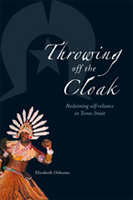Throwing Off the Cloak: Reclaiming self-reliance in Torres Strait
Summary
Throwing off the cloak opens a window onto the Torres Strait Islands peoples’ struggles for control over their own lives, and recognition of their unique island identities and aspirations.
For 160 years the Islanders have resisted governments’ continued dismissal of their ambitions. Foregrounding the Islanders’ views throughout, Osborne explores debates centering on their struggle to recover their rights to their land, sea, fish resources, and to make decisions for their own wellbeing. A successful example of their passive resistance and emerging skills in dealing with political leaders was the successful Border Not Change protest.
Torres Strait Islander fishers have struggled against governmental control of their sea resources and those who take mercilessly from them. One Torres Strait Island leader articulated what identity means to him when asked, ‘What are you claiming, are you claiming the sea, the beach or the resources?’ He replied, ‘If an oil tanker ran aground it kills the bed, kills the fish and it kills me’.
Throwing off the cloak is essential reading for anyone interested in Indigenous responses to colonisation.
Elizabeth Osborne’s association with Torres Strait began in 1967. For five years she and her husband lived on Thursday Island, and their relationship with Torres Strait continues today. Her book, Torres Strait Islander women and the Pacific War, was published in 1997.
Reviews and endorsements
'Dr Elizabeth Osborne presents a brief yet compelling picture of the Torres Strait — the archipelago of islands between the Cape York Peninsula and Western New Guinea – from the initial experience of British colonisation during the nineteenth century to the modern day.'
— Sarah Burnside, Reviews in Australian Studies Vol. 7, No. 4 (2013). Read the full review here.
'This is a passionately-written and valuable chronicle of events of great significance to the recent history of Torres Strait and has broader resonances for the future of remote Aboriginal mainland communities.'
— Dr Anna Shnukal, Queensland Museum
'This book will contribute to empowering the Torres Strait Islander people, particularly the current and next generation of leaders, by knowing the history of the struggle for self-reliance and land and sea rights, so that they can themselves be better prepared to achieve their goals.'
— Dana Ober, Tagai State College
